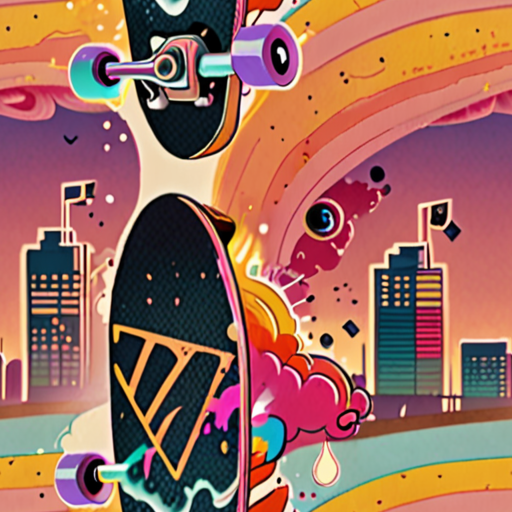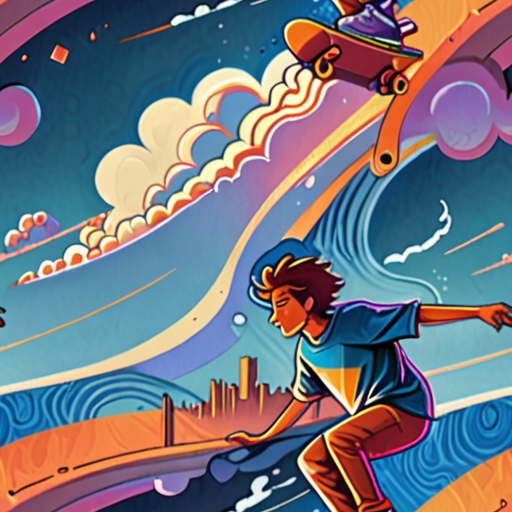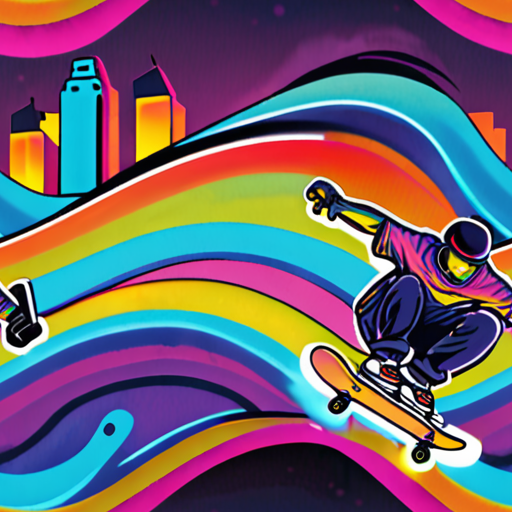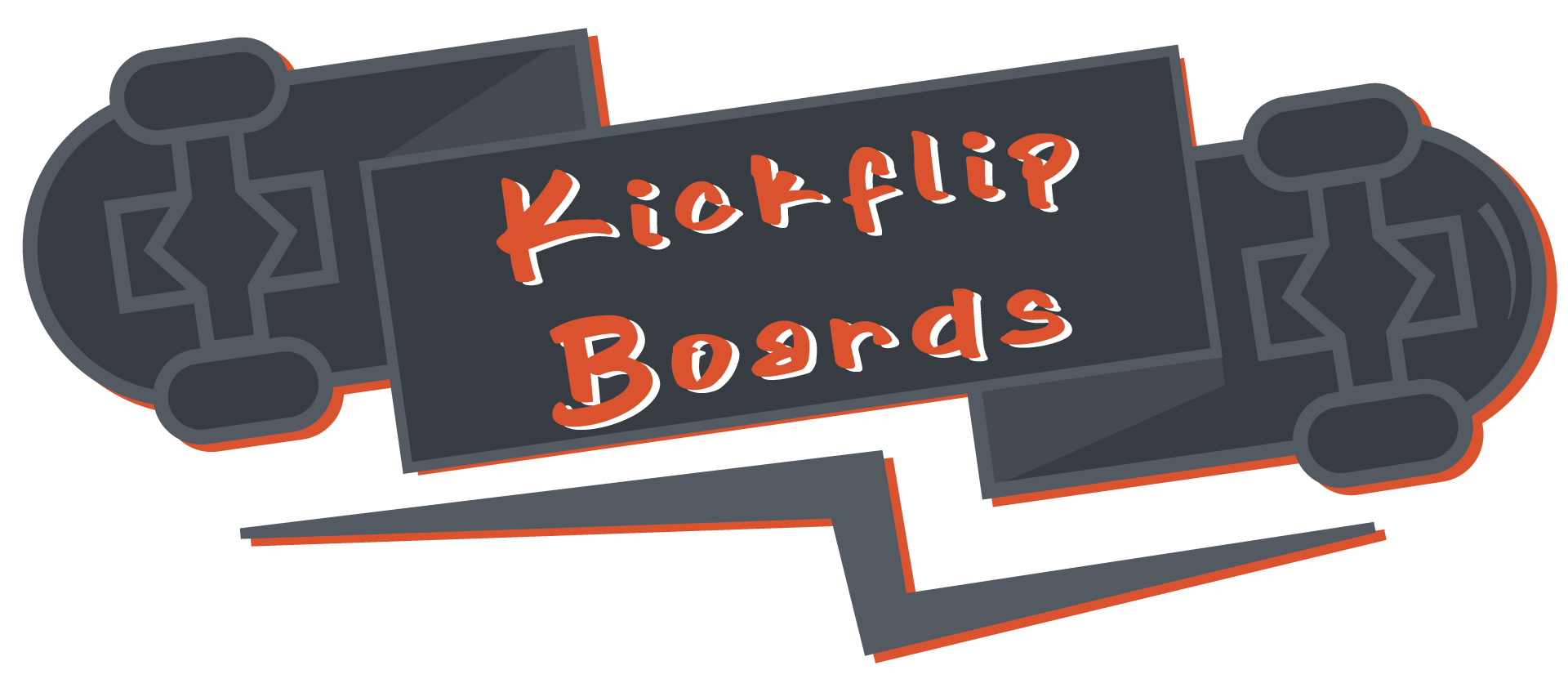“`html
Discover the vibrant world of the skateboard lifestyle, where freedom, culture, and adrenaline intertwine to create a unique way of life. From its humble beginnings to becoming a global phenomenon, skateboarding has evolved into a sport that transcends competition, offering more than just tricks on a board. Join us on a journey through the history and evolution of skateboarding culture, exploring how this thrilling activity can positively impact mental health, aid in managing ADHD symptoms, and even become a viable career. This comprehensive guide delves into the heart of the skateboarding community, capturing its essence through evocative pictures and narratives, and unraveling why this lifestyle captivates and addictively enchants participants worldwide.
“`
What is a Skater Lifestyle?
Living a skateboard lifestyle means embracing the values and beliefs of the skateboard community, which includes creativity, individuality, and self-expression.
-
Creativity
Skateboarders are known for pushing the limits of what’s possible on a board, whether it’s inventing new tricks or experimenting with different styles.
We encourage our readers to think outside the box and express themselves through their skating, whether it’s through music, art, or fashion.
-
Individuality
Skateboarding is all about being true to oneself and expressing one’s unique personality through the sport.
We celebrate the diversity of the skate community and welcome riders of all ages, backgrounds, and skill levels.
-
Self-Expression
Skateboarding is a powerful tool for self-expression, allowing riders to convey their emotions, thoughts, and ideas through movement and style.
We believe that every rider has a unique story to tell, and we’re committed to helping them share it with the world.
The Skate Culture
The skate culture is built around a sense of community and camaraderie, with riders supporting and inspiring each other to push the limits of what’s possible.
We’re proud to be part of this community, and we strive to create content that inspires and educates our readers.
Skateboarding Techniques
From basic ollies to advanced 360 flips, there’s always something new to learn in the world of skateboarding.
We offer tips and tutorials on various skateboarding techniques, as well as product reviews and gear recommendations to help our readers improve their skills.
Skateboarding Community
The skate community is made up of riders from all walks of life, united by a shared passion for the sport.
We believe that everyone deserves access to high-quality skateboarding content, regardless of their skill level or background.
Conclusion
At Kickflip Boards, we’re dedicated to helping our readers live their best lives through skateboarding.
We hope that this guide has inspired you to explore the world of skate culture and find your own unique place within it.
Learn More About Our Skateboarding Community
What is Skateboarding Culture?
Skateboarding culture is a vibrant and dynamic community that celebrates creativity, self-expression, and individuality.
- At its core, skateboarding culture is about embracing the freedom to express oneself through movement and style.
- Skateboarders draw inspiration from various art forms, music genres, and fashion trends, incorporating these influences into their skating and personal style.
- The culture values creativity, experimentation, and innovation, encouraging skaters to push boundaries and try new things.
Key Elements of Skateboarding Culture
- Creativity and Self-Expression: Skateboarding allows individuals to express themselves through unique tricks, styles, and personalities.
- Community and Camaraderie: Skaters often form close bonds with fellow riders, sharing experiences and supporting one another.
- Adaptability and Resilience: Skateboarding requires skaters to adapt to changing environments, obstacles, and circumstances, fostering resilience and perseverance.
- Innovation and Progression: The culture encourages continuous learning, improvement, and innovation, driving advancements in technique, equipment, and style.
Impact of Skateboarding Culture
Skateboarding culture extends beyond the sport itself, influencing fashion, music, film, and art.
- Fashion: Skateboarding-inspired clothing and accessories have become popular among young people worldwide.
- Music: Skateboarding culture has influenced various music genres, including punk, hip-hop, and electronic dance music.
- Film and Art: Skateboarding has been featured in numerous films, documentaries, and art exhibitions, showcasing its creative and expressive aspects.
Evolution of Skateboarding Culture
Skateboarding culture continues to evolve, reflecting changes in society, technology, and individual perspectives.
- Diversity and Inclusion: Skateboarding culture has become more inclusive, welcoming diverse backgrounds, ages, and abilities.
- Sustainability and Environmental Awareness: Many skaters now prioritize eco-friendliness, advocating for environmentally responsible practices and products.
- Technological Advancements: Advances in technology have improved skateboarding equipment, allowing for increased accessibility and innovation.
Conclusion
Skateboarding culture is a rich tapestry of creativity, self-expression, and community, continuously evolving to reflect the needs and aspirations of its participants.

Can You Skateboard for a Living?
As a passionate skateboarder, I’ve always wondered if it’s possible to turn my love for the sport into a full-time career.
- Sponsorships: Many professional skateboarders earn money through sponsorships with brands that provide financial support in exchange for promoting their products.
- Tournaments and Competitions: Winning tournaments and competitions can lead to prize money and recognition within the skateboarding community.
- Product Endorsements: Skaters can partner with companies to endorse their products, such as skateboards, shoes, and clothing.
- Teaching and Coaching: Experienced skaters can offer lessons and coaching services to beginners, helping them improve their skills and progress in the sport.
However, becoming a successful professional skateboarder requires dedication, hard work, and a strong passion for the sport.
The Path to Becoming a Pro Skater
- Develop Your Skills: Practice regularly to master various tricks and techniques.
- Join Local Skate Parks and Communities: Connect with other skaters, learn from them, and stay updated on local events and competitions.
- Network and Build Relationships: Establish relationships with sponsors, brands, and other professionals in the industry.
- Stay Focused and Motivated: Set goals, track your progress, and stay committed to your vision.
Challenges and Opportunities
While becoming a pro skater can be rewarding, it’s essential to acknowledge the challenges and opportunities that come with this path:
- Risks and Injuries: Skateboarding can be physically demanding, and injuries are common.
- Competition and Pressure: The skateboarding world is highly competitive, and pressure to perform can be intense.
- Opportunities for Growth: With dedication and perseverance, skaters can grow their careers, gain recognition, and inspire others.
Conclusion is Not Needed
Skateboarding can indeed be a viable career option for those who are passionate, dedicated, and willing to put in the effort.
By developing your skills, networking, and staying focused, you can increase your chances of success in the skateboarding world.
Remember, becoming a pro skater takes time, patience, and persistence, but the rewards can be well worth the journey.

Is Skateboarding Good for Mental Health?
Skateboarding has long been associated with physical benefits, but its impact on mental well-being is equally impressive.
- The activity has been shown to reduce anxiety and depression symptoms by providing an outlet for stress and boosting mood.
- Skateboarding fosters a sense of achievement and accomplishment, which can lead to increased self-esteem and confidence.
- Engaging in skateboarding can also promote social connections and a sense of community, as many skaters join local skate parks and clubs.
Physical Activity and Mental Health
Regular physical activity, such as skateboarding, has been consistently linked to improved mental health outcomes.
- Exercise releases endorphins, which are chemicals in the brain that act as natural painkillers and mood elevators.
- Physical activity has also been shown to reduce symptoms of anxiety and depression by promoting relaxation and reducing stress levels.
- In addition, exercise can improve sleep quality, which is often disrupted in individuals experiencing mental health issues.
The Therapeutic Benefits of Skateboarding
Skateboarding offers several therapeutic benefits that can contribute to improved mental health.
- The activity requires focus and concentration, which can help distract from negative thoughts and emotions.
- Skateboarding also promotes mindfulness, as participants need to be present in the moment to navigate obstacles and challenges.
- Furthermore, skateboarding can provide a sense of flow, which is a state of complete absorption and engagement in an activity.
Getting Started with Skateboarding
If you’re interested in trying skateboarding for mental health benefits, here are some steps to get started:
- Invest in proper safety equipment, including a helmet, knee pads, and elbow pads.
- Find a local skate park or beginner-friendly spot to practice.
- Start with basic skills, such as balancing and pushing, before progressing to more advanced tricks.
- Consider taking lessons from a qualified instructor to learn proper technique and safety guidelines.
Maintaining a Healthy Skateboarding Routine
To maximize the mental health benefits of skateboarding, it’s essential to establish a regular routine.
- Aim to skate at least 2-3 times per week, with a mix of practice and fun sessions.
- Set realistic goals and challenge yourself to improve your skills and progress.
- Make sure to warm up and cool down properly before and after skating to prevent injuries and promote recovery.
Is Skateboarding Good for ADHD?
Skateboarding has been gaining popularity as a potential treatment option for Attention Deficit Hyperactivity Disorder (ADHD), offering numerous benefits for individuals with the condition.
- Improved Focus: Skateboarding requires concentration and focus, which can help individuals with ADHD develop these essential skills.
- Boosted Confidence: Mastering tricks and techniques can give individuals with ADHD a sense of accomplishment and boost their self-confidence.
- Enhanced Motor Skills: Skateboarding helps improve coordination, balance, and overall motor skills, which can be beneficial for individuals with ADHD who often struggle with fine motor control.
- Reduced Stress: Engaging in physical activity like skateboarding can help reduce stress and anxiety levels, common comorbidities associated with ADHD.
Research suggests that regular skateboarding can lead to significant reductions in ADHD symptoms, particularly inattention and hyperactivity.
- The study found that participants who engaged in skateboarding for four months experienced a notable decrease in symptoms of inattention and hyperactivity.
- Skateboarding was also shown to have a positive impact on balance and overall physical fitness.
While skateboarding may not be a replacement for traditional treatments, it can be a valuable addition to an individual’s treatment plan, offering a fun and engaging way to manage ADHD symptoms.
As a community-driven platform, we encourage individuals with ADHD to explore skateboarding as a potential therapeutic outlet, promoting physical activity, social interaction, and mental well-being.
For those interested in learning more about skateboarding and its benefits for ADHD, we recommend checking out our skateboarding tips for beginners and exploring local skate parks and communities.
We also suggest visiting reputable online resources, such as the Children and Adults with Attention Deficiency/Hyperactivity Disorder (CHADD) website, for more information on ADHD management and treatment options.
By incorporating skateboarding into their lives, individuals with ADHD can experience improved focus, boosted confidence, and enhanced overall well-being.

Why is Skateboarding So Addictive?
As a skateboard enthusiast, I’ve often found myself wondering why skateboarding is so addictive. Is it the thrill of landing a difficult trick, the sense of community among fellow skaters, or something deeper? In this article, we’ll explore the reasons behind skateboarding’s addictive nature.
- The Sense of Accomplishment
- The Thrill of the Unknown
- The Social Aspect
- The Creative Expression
- The Physical and Mental Challenge
Every time you land a tricky maneuver or complete a challenging course, you feel a surge of pride and accomplishment. This sense of achievement is a powerful motivator, driving you to continue pushing yourself and improving your skills.
Skateboarding involves a certain level of unpredictability, whether it’s navigating unfamiliar terrain or attempting a new trick. This uncertainty creates a thrilling experience, keeping you engaged and eager to take on new challenges.
Skateboarding has a strong social component, with many skaters forming close bonds with their peers. Sharing experiences, learning from others, and participating in competitions or events fosters a sense of camaraderie and belonging.
Skateboarding allows you to express yourself creatively through tricks, style, and self-expression. As you develop your skills, you can experiment with different techniques, combining them in innovative ways to create unique and personalized moves.
Skateboarding requires a combination of physical fitness, coordination, and mental toughness. Overcoming obstacles and persevering through setbacks builds resilience and confidence, making the experience even more rewarding.
The Science Behind Addiction
Research suggests that addiction is closely tied to the brain’s reward system, which releases dopamine in response to pleasurable activities. Skateboarding triggers this response by releasing endorphins, also known as “feel-good” hormones, which create a sense of euphoria and satisfaction.
Conclusion
In conclusion, skateboarding’s addictive nature can be attributed to a combination of factors, including the sense of accomplishment, thrill of the unknown, social aspect, creative expression, and physical and mental challenge. By understanding these underlying motivations, we can better appreciate the allure of skateboarding and the reasons why it continues to captivate enthusiasts worldwide.

0 Comments